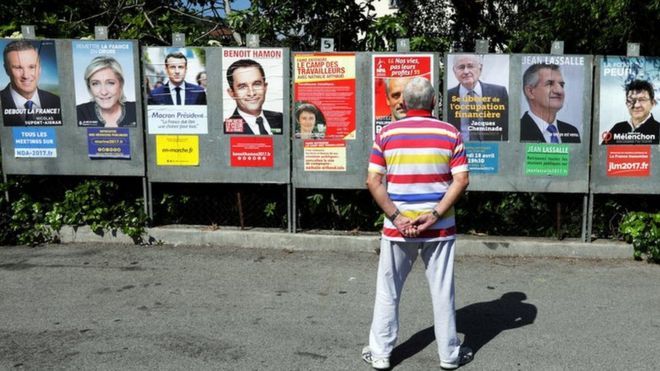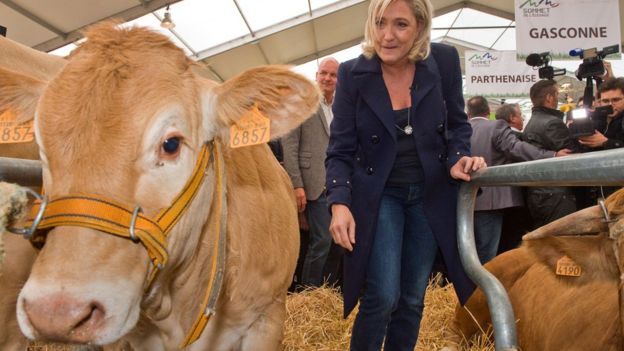French election 2017: Why is it important?
 REUTERS
REUTERS
The world is watching to see if France becomes the next major country to challenge liberal values and the political establishment.
Two of the four candidates leading in the polls occupy the political extremes - the far-right Marine Le Pen and hard-left Jean-Luc Mélenchon.
The victory of either would place a question mark over France's continued membership of the EU in its present form. Were it to leave, could the EU survive the exit of one of its founding fathers?
And Thursday's fatal assault on a policeman by a Paris gunman - just the latest in a spate of attacks that has plagued the country - has only heightened the febrile atmosphere.
After the Brexit vote in the UK and election of US President Donald Trump, could France be the next nation to deal a blow to politics as usual?
What is new about this election?
The unpopular President François Hollande, a Socialist, is not seeking a second term - the first French president to opt out in modern history.
There are 11 candidates and the race is wide open. None looks likely to win more than 50% in the first round of voting on 23 April, so a run-off on 7 May seems assured.
French politics has historically been dominated by parties of the left and centre-right, but this model could be shattered this time around.
The Socialist candidate, Benoît Hamon, is seen as out of the running. His conservative rival, Republicans' candidate François Fillon, has had to battle to stay in the race after he was plunged into a judicial inquiry over "fake jobs".
Who could win?
If you believe the opinion polls there are two front-runners, far-right National Front leader Ms Le Pen and centrist Emmanuel Macron.
Ms Le Pen took over the leadership of the FN from her father in 2011 and has worked hard to "detoxify" the party from its extreme past.
 GETTY IMAGES
GETTY IMAGES
Mr Macron, a 39-year-old ex-investment banker, was economy minister under President Hollande but resigned in 2016 to fight for the presidency as head of his En Marche! (On the move) party. Not only has he never been an MP - he has never stood for election.
The early favourite was Mr Fillon, but his hopes were dented by allegations that he paid his wife public money for work she did not do. He is now under formal investigation, blaming a political conspiracy, but he is not out of the race and his team is still confident of making the second round.
 AFP
AFP
A surprise package in the election is far-left stalwart Mr Mélenchon, whose witty charisma has attracted new supporters.
What are the issues?
One of the overriding issues facing French voters is unemployment, which stands at almost 10% and is the eighth highest among the 28 EU member states. One in four under-25s is unemployed.
The French economy has made a slow recovery from the 2008 financial crisis and all the leading candidates say deep changes are needed.
Is the Fillon payment affair fake news?
That's what an investigating judge is hoping to find out.
Satirical weekly Le Canard Enchainé says his wife Penelope was paid €831,400 (£710,000; $900,000) for work as a parliamentary assistant that she did not carry out. One report suggested she did not even have a parliamentary pass or a work email.

She is also said to have pocketed €100,000 for writing just a handful of articles for a literary review owned by a billionaire friend of the family.
Mr Fillon insists everything was above board and says the investigation against him is a "political assassination" designed to deny French voters the choice of a centre-right candidate.
What makes the National Front far-right?
Ms Le Pen is fighting to appeal to the centre and left of French politics after working to move the party away from the image of her father, who has been repeatedly convicted for hate speech and describing the Holocaust as a "detail of history".

But she still has a far-right platform. She wants to allocate public services to French citizens ahead of foreigners and has vowed to suspend all legal immigration.
The FN also has close ties with other European parties such as Austria's far-right Freedom Party that mainstream right-wing parties want nothing to do with.
No comments:
Post a Comment